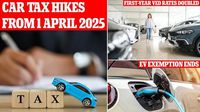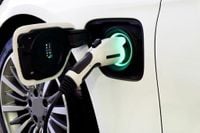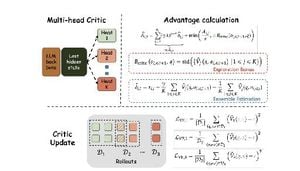Major changes to Vehicle Excise Duty (VED) in the UK took effect on April 1, 2025, significantly impacting drivers of all types of vehicles, especially electric vehicles (EVs). For the first time, EV owners will be required to pay road tax, a move that has sparked controversy among environmental advocates and the automotive industry alike.
Under the new regulations, electric, zero, or low-emission cars registered on or after April 1, 2025, will incur a first-year vehicle tax of £10. Subsequently, from the second year onwards, drivers will pay a standard rate of £195. This change marks a significant shift from the previous tax exemption that EVs enjoyed, which has now ended, as confirmed by Chancellor Rachel Reeves during the Autumn Budget last year.
Moreover, the tax implications are even more complex for new electric vehicles with a list price exceeding £40,000. Owners of these vehicles will face an additional charge of £425 annually, known as the Expensive Car Supplement (ECS), which will apply for five years starting from the vehicle's second year. This means that the total annual tax for high-value EVs could reach £620, a considerable increase that may deter potential buyers.
David Hall, Vice President of Power Systems UK&I at Schneider Electric, voiced his concerns regarding the changes, stating, "Cutting tax incentives for electric vehicles is like slamming the brakes on progress in the fight against climate change. While we are seeing demand increase for both new and used EVs, we need to accelerate demand before the ban on petrol and diesel cars comes into force in 2030." Hall's sentiments reflect broader worries about the potential slowdown in the transition to electric vehicles amidst these new tax burdens.
In addition to the changes affecting EVs, drivers of petrol and diesel vehicles will also see increased costs. For example, the first-year tax rates for petrol and diesel cars emitting over 75g/km of CO2 will double, with some luxury models facing tax bills as high as £5,490. This drastic increase is expected to raise an estimated £400 million for the Treasury in the upcoming year and a staggering £1.7 billion by the end of the decade.
The Society of Motor Manufacturers and Traders (SMMT) has previously highlighted that reforming tax to encourage the purchase of EVs is essential to avoid delaying the uptake of cleaner vehicles. Mike Hawes, SMMT Chief Executive, emphasized, "The Chancellor must end the perverse fiscal system that discourages drivers from moving away from fossil fuels and send a clear signal that the time to go electric is now. Success will see our economy powered up by zero-emission mobility, delivering cleaner air, quieter roads and cheaper running costs, ending the uncertainty we are seeing amongst motorists."
Insurance experts have also warned that older drivers, particularly baby boomers, will be disproportionately affected by these changes. A report from Go.Compare revealed that this demographic is more likely to drive older, highly polluting petrol or diesel cars, which will now incur higher rates. Collectively, baby boomers are expected to pay an additional £40.5 million in taxes as a result of the new regulations.
According to the research, just six percent of baby boomers drive either a battery electric or hybrid electric car, compared to 11 percent of millennials and nine percent of Generation X. This disparity highlights the challenges older drivers face in adapting to the evolving automotive landscape.
With the new tax rules in place, many drivers may be unaware of the financial implications of purchasing a new vehicle. A recent survey found that less than half (48%) of drivers are aware of the April 2025 increase in first-year rates for VED. If buying habits from 2024 continue, nearly 200,000 new cars could be purchased without buyers realizing the extra tax involved, resulting in an estimated £83.5 million in additional tax payments.
As consumers navigate these changes, experts recommend several strategies to mitigate costs. For instance, potential buyers are encouraged to consider leasing options or purchasing second-hand electric vehicles that were registered before the tax changes took effect. Additionally, exploring industry-specific discounts can provide significant savings, particularly for frontline service workers.
Josh Halt, an account manager at Motorfinity, shared tips for prospective buyers: "If you're uncertain, always collaborate with your car dealer or broker to find a different car or finance deal that fits your current financial circumstances. The market is brimming with new models and emerging brands offering competitive prices."
Halt also noted that opting for a 'black box' insurance policy might yield significant savings, especially for smaller city cars. "These savings are particularly noticeable on smaller city cars, which typically see the greatest percentage reductions of 30-50%." He emphasized the importance of understanding the vehicle's CO2 output, as this is a key factor in determining tax rates.
As the new tax system unfolds, drivers must stay informed about their vehicles' emissions and the associated costs. With VED rates now tied closely to CO2 emissions, the financial landscape for car ownership in the UK has shifted dramatically. The changes aim to encourage a transition to cleaner vehicles but may also create financial hurdles for many drivers.
In summary, the introduction of VED changes on April 1, 2025, signals a new era for vehicle taxation in the UK. While the government aims to promote electric and low-emission vehicles, the associated costs may deter some drivers from making the switch. As consumers weigh their options, awareness and adaptability will be crucial in navigating this evolving automotive landscape.










